
Sunil Gangopadhyay or Sunil Ganguly was an Indian poet, novelist, short story writer, historian, and critic in the Bengali language. He was one of the foremost poets experimenting with new forms, themes, rhythms, and words in Bengali poetry in the 1950s and 1960s. In 1953, along with Deepak Majumder and Ananda Bagchi, he founded the Bengali poetry magazine, Krittibas. He is regarded as one of the most prolific and popular writers in Bengali since Rabindranath Tagore.
Indian literature refers to the literature produced on the Indian subcontinent until 1947 and in the Republic of India thereafter. The Eighth Schedule to the Constitution of India has 22 officially recognised languages. Sahitya Akademi, India's highest literary body, also has 24 recognised literary languages.
Indian poetry and Indian literature in general, has a long history dating back to Vedic times. They were written in various Indian languages such as Vedic Sanskrit, Classical Sanskrit, Ancient Meitei, Modern Meitei, Telugu, Tamil, Odia, Maithili, Kannada, Bengali, Assamese, Hindi, Marathi and Urdu among other prominent languages. Poetry in foreign languages such as English also has a strong influence on Indian poetry. The poetry reflects diverse spiritual traditions within India. In particular, many Indian poets have been inspired by mystical experiences. Poetry is the oldest form of literature and has a rich written and oral tradition.

Mahasweta Devi was an Indian writer in Bengali and an activist. Her notable literary works include Hajar Churashir Maa, Rudali, and Aranyer Adhikar. She was a leftist who worked for the rights and empowerment of the tribal people of West Bengal, Bihar, Madhya Pradesh and Chhattisgarh states of India. She was honoured with various literary awards such as the Sahitya Akademi Award, Jnanpith Award and Ramon Magsaysay Award along with India's civilian awards Padma Shri and Padma Vibhushan.

Sankha Ghosh was an Indian poet and literary critic. He was born in Chandpur District of the then Bengal Presidency, present day Bangladesh. His ancestral home was at Banaripara Upazila in Barisal District. He spent his childhood and adolescence in Ishwardi Upazila of Pabna District, which was his father's workplace.

The Pashchimbanga Bangla Akademi is the official regulatory body of the Bengali language in India. It was founded on 20 May 1986 in Kolkata to act as the official authority of the language and is entrusted with the responsibility of reforming Bengali spelling and grammar, compiling dictionaries, encyclopedias and terminologies and promoting Bengali language and culture in West Bengal. They are widely accepted by the Governments of West Bengal and Tripura as well as a considerable number of private publishing houses and institutions such as the Oxford University Press and the Ramakrishna Mission.

Tarasankar Bandyopadhyay was an Indian novelist who wrote in the Bengali language. He wrote 65 novels, 53-story-books, 12 plays, 4 essay-books, 4 autobiographies, 2 travel stories and composed several songs. He was awarded Rabindra Puraskar, Sahitya Akademi Award, Jnanpith Award, Padma Shri and Padma Bhushan. He was nominated for Nobel Prize in Literature in 1971 and posthumously nominated in 1972.
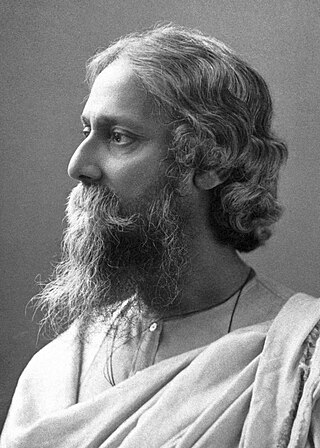
Bengali literature denotes the body of writings in the Bengali language and which covers Old Bengali, Middle Bengali and Modern Bengali with the changes through the passage of time and dynastic patronization or non-patronization. Bengali has developed over the course of roughly 1,400 years. If the emergence of the Bengali literature supposes to date back to roughly 650 AD, the development of Bengali literature claims to be 1600 years old. The earliest extant work in Bengali literature is the Charyapada, a collection of Buddhist mystic songs in Old Bengali dating back to the 10th and 11th centuries. The timeline of Bengali literature is divided into three periods: ancient (650–1200), medieval (1200–1800) and modern. Medieval Bengali literature consists of various poetic genres, including Hindu religious scriptures, Islamic epics, Vaishnava texts, translations of Arabic, Persian and Sanskrit texts, and secular texts by Muslim poets. Novels were introduced in the mid-19th century. Nobel laureate Rabindranath Tagore is the best known figure of Bengali literature to the world. Kazi Nazrul Islam, notable for his activism and anti-British literature, was described as the Rebel Poet and is now recognised as the National poet of Bangladesh.
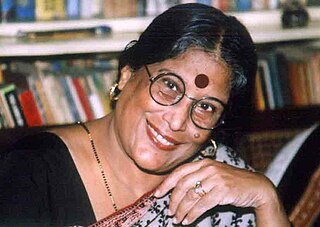
Nabaneeta Dev Sen was an Indian writer and academic. After studying arts and comparative literature, she moved to the US where she studied further. She returned to India and taught at several universities and institutes as well as serving in various positions in literary institutes. She published more than 80 books in Bengali: poetry, novels, short stories, plays, literary criticism, personal essays, travelogues, humour writing, translations and children's literature. She was awarded the Padma Shri in 2000 and the Sahitya Akademi Award in 1999.
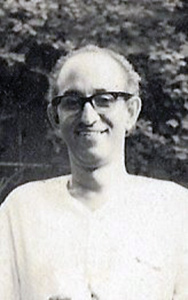
Narayan Gangopadhyay, also known as Narayan Ganguly, was an Indian novelist, poet, essayist, and short story writer, and one of the leading writers of modern Bengali literature. He introduced the endearing character of Tenida in his famous stories of children's literature. He took up "Narayan" as his pen name. He married his brother in law's niece Renuka Devi, with whom he had his only daughter Basabi (Bani). His wife Renuka Ganguly and daughter Basabi Roy Chowdhury were also eminent writers and teachers. Renuka Ganguly died on 10 February 2010 whereas, Basabi Roy Chowdhury recently died on 17 December 2021, and was survived by 6 children, and grandchildren.

Ashapurna Devi, also Ashapoorna Devi or Ashapurna Debi, was a prominent Indian novelist and poet in Bengali. In 1976, she was awarded the Jnanpith Award and Padma Shri by the Government of India, D.Litt. by the Universities of Jabalpur, Rabindra Bharati, Burdwan and Jadavpur. Vishwa Bharati University honoured her with Deshikottam in 1989. For her contribution as a novelist and short story writer, the Sahitya Akademi conferred its highest honour, the Sahitya Akademi Fellowship, in 1994.
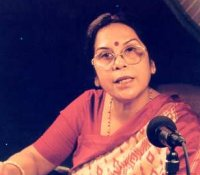
Bani Basu is a prolific Bengali Indian author, essayist, critic, poet, translator and professor.
S. Krishnamoorthy or S. Krishnamurthy has been writing short stories and articles in English and Tamil for over four decades. He was also the winner of prestigious Sahitya Akademi prize for translation.
Khagendranath Mitra (1896–1978) was a writer for children of Bengal. Even today his writings continue to be popular among children and preteens.

Those Days is a historical novel by Indian writer Sunil Gangopadhyay. It was first published as a serialized novel in the Bengali literary magazine Desh. Gangopadhyay won the Sahitya Akademi Award for the novel in 1985.
Utpal Kumar Basu was a Bengali poet and story teller.

Anila Amrutlal Dalal is Gujarati critic and translator.
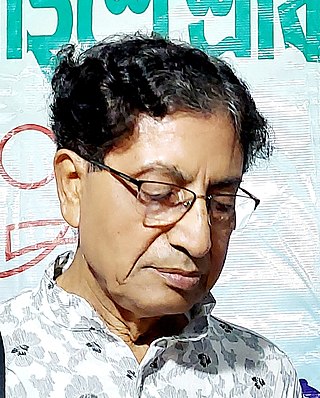
Tapan Bandopadhyay is an eminent Bengali novelist. He won the Sahitya Akademi Award in 2022 for his novel Birbal.
Sunil Naliyath is a Malayalam language writer and translator from Kerala, India. He translated many noted literary works in Bengali to Malayalam. He received many awards including the Kerala Sahitya Akademi Award for Translation in 2014 and the Sahitya Akademi Award for Translation in 2022.













